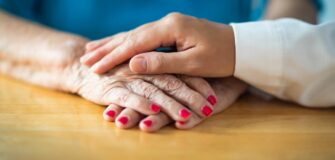Breaking the stigma of addiction and mental health: Insights from The Banyans Healthcare CEO Ruth Limkin
Share
The healthcare industry can be frustrating and overwhelming for patients who often have to coordinate their care across multiple providers.
Treatment often happens in silos and providers may not have the time to sit down with the entire treatment team to discuss a patient’s progress.
The Banyans Healthcare is a different kind of healthcare provider, offering a holistic approach to health and wellness that is more collaborative and comprehensive than traditional healthcare models.
In this Featured Leader interview with Ruth Limkin, founder and CEO of The Banyans Healthcare, we learn about their approach to healthcare based on a whole-person model of care.
What types of programs and services do you offer and how is it tailored to meet the individual needs of clients?
Ruth: We offer both ‘live in’ and intensive outpatient treatment for chronic stress and burnout, through to treating eating disorders, other mental health conditions and addiction. Whether it is drinking too much alcohol, often to self-medicate stress, or using prescription or illicit substances, or engaging in compulsive behaviours, we can help people regain control of their health.
We tailor in a range of ways, including working with each person to define their goals and then tailoring their individual sessions in response. We can add more of one kind of treatment as well as organising schedules so people can respond to work or other responsibilities.
We know that it’s hard to disengage from work and life so work with each person to find ways to balance focusing on recovery with fulfilling essential responsibilities.
(Of course, we also help coach people that some responsibilities can be deferred or delegated to others in their life for a season).
How do you incorporate evidence-based practises into its treatment programs and what role does ongoing research play in shaping your services?
Ruth: We measure people’s emotional and physical metrics before and after their treatment so we can continue to measure outcomes. We include treatment options that are well-researched and long accepted, as well as incorporating recent innovations in research.
We draw from a range of international studies and examples of what works, as well as testing and measuring what works in the context of different conditions and different client needs.
Our staff continue to develop their professional learnings and accreditations so we can stay on top of current best practice. We have some internal research but have also put in place an MOU with Torrens University Australia and working on developing a joint research project together.
How does The Banyans Healthcare incorporate mindfulness and other complementary therapies into its treatment programs and what benefits do these approaches offer?
Research in mindfulness consistently demonstrates a wide range of benefits and we incorporate this into all of our treatment programs. For example, benefits include decreases in anxiety, depression, rumination, and emotional reactivity. In addition, improvements in feelings of well-being, positive affect, and concentration have been reported.
It’s important to engage a range of therapy modalities. There are many treatment methods that aren’t available in public healthcare due to constraints, but which have tremendous benefit. For example, Equine Assisted Psychotherapy has been shown to improve self-esteem, self-regulation, relaxation, interpersonal relationships and stress management.
Can you discuss some of the unique challenges that individuals with addiction or mental health issues face when seeking treatment, and how you work to address these challenges?
Ruth: In some ways, the challenges are no different to seeking treatment for any health condition – there’s the fear of unknown, the logistical challenges of your life being disrupted, and managing how to meet work and family responsibilities during treatment.
The one thing that makes seeking treatment for addiction and mental health is that people often feel they can’t be open about their need for treatment.
Until we normalise conversations about addiction and mental health, it can be harder to admit to than seeking treatment for something like cancer. However, mental health is human health and we are all affected by it at some point and to some degree. The more we talk about it the more we can encourage people to get help quickly.
How do you support clients in their long-term recovery and what resources are available to help them maintain their progress after leaving your facility?
Ruth: Part of someone’s treatment will usually include a ‘return to life’ plan that is developed with their psychologist. This looks at each facet of life and identifies local support and ideas for continuing to engage in healthy choices.
Depending on the program type that a client has participated in, they may have up to two years of post-residential aftercare available to them. This is delivered via telehealth and provides a supported reintegration to life.
What advice would you give to individuals who may be hesitant to seek treatment for addiction or mental health issues and how can loved ones support them in taking this important step?
Ruth: I’d encourage people not to delay – reach out for help now. The longer we wait to access treatment, the more serious the condition can be which can mean more intensive interventions are needed.
The longer we wait, the more the consequences to our health, our professional performance and our relationships pile up.
Loved ones can support people in two ways. Firstly, suggesting the need for support in a caring manner can be an important first conversation in acknowledging need. Doing some research before to inform this conversation is often helpful so you can present some potential treatment options. Second, providing personal and practical support to help them access treatment in amidst their life can go a long way to removing barriers.
Ritchelle is a Content Producer for Healthcare Channel, Australia’s premier resource of information for healthcare.




